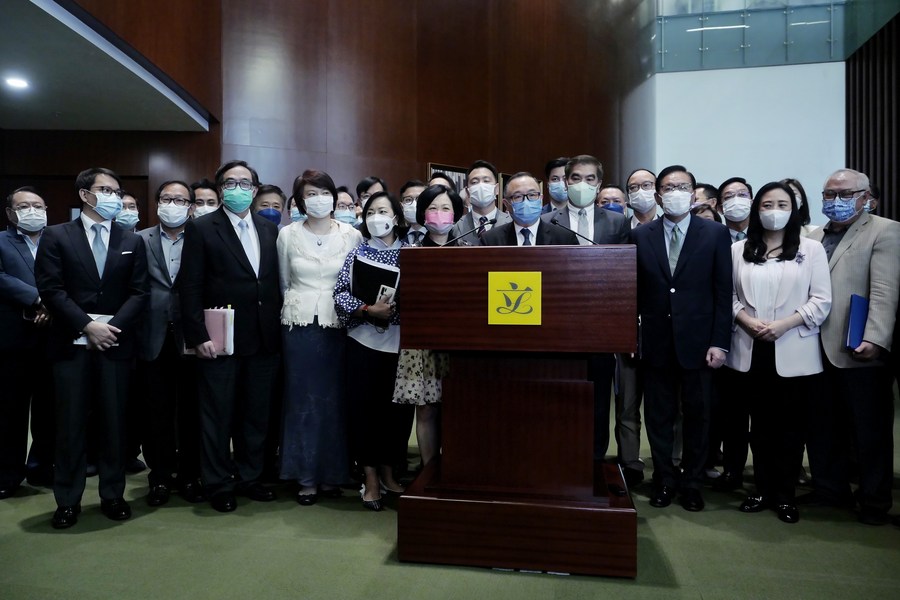Hong Kong starts new chapter with improved electoral system
With a bill amending electoral laws adopted on Thursday, a new democratic electoral system has taken shape in Hong Kong and will enable the global financial hub to open a new chapter of good governance and maintain long-term peace and prosperity.
With a bill amending electoral laws adopted on Thursday, a new democratic electoral system has taken shape in Hong Kong and will enable the global financial hub to open a new chapter of good governance and maintain long-term peace and prosperity.

Lawmakers take part in the third reading of amendments to Hong Kong's electoral laws at the Legislative Council (LegCo), in Hong Kong, south China, May 27, 2021. (Xinhua/Wang Shen)
With 40 votes in favor and two against, the Improving Electoral System (Consolidated Amendments) Bill 2021 was approved in its third reading by the Legislative Council (LegCo) of China's Hong Kong Special Administrative Region (HKSAR), after it was first brought to Hong Kong lawmakers on April 14.
HKSAR Chief Executive Carrie Lam called the bill's passage a "landmark occasion" for ensuring "patriots administering Hong Kong" under "one country, two systems."
The bill's passage followed related amendments made at the state level by the country's top legislature earlier this year.
The Standing Committee of the National People's Congress adopted on March 30 the amended Annex I and Annex II to the HKSAR Basic Law, which concerns methods for the selection of the HKSAR chief executive and the formation of the LegCo.
Improving the electoral system was another major step following last year's national security legislation to put an end to violence and political instability and get Hong Kong back on track, said the chief executive.
Stressing the urgency and necessity of improving the electoral system, Lam said anti-China disruptors capitalized on the electoral loopholes to enter the HKSAR's power structure in recent years, jeopardizing Hong Kong's constitutional order and endangering national security.

Lawmakers meet the press at the Legislative Council (LegCo) after the Improving Electoral System (Consolidated Amendments) Bill 2021 was approved in Hong Kong, south China, May 27, 2021. (Xinhua/Wang Shen)
During the two-day debates from Wednesday, lawmakers briskly expressed their views on the bill.
Starry Lee, a LegCo member and chairwoman of the Democratic Alliance for the Betterment and Progress of Hong Kong, said the new electoral system is crucial to Hong Kong's future development from economic growth to people's well-being.
Regina Ip, a LegCo member and chairwoman of the New People's Party, said the amended laws have gone through strict scrutiny and the legislation will help Hong Kong open a new chapter.
With the improved electoral system, Hong Kong will have a democratic system of its own characteristics and step on the road of good governance, lawmaker Junius Ho said.
Under the electoral improvement, the membership of the Election Committee, which elects the HKSAR chief executive and part of LegCo members and nominates LegCo candidates, has been expanded from 1,200 to 1,500. The number of LegCo members has also been increased from 70 to 90.
Pro-establishment lawmakers pointed out that under the new electoral system, the Election Committee and the LegCo will have a broader representation of various sectors in Hong Kong, which will improve the efficiency of Hong Kong's administration and help resolve deep-seated social problems.
The amended laws will be published in the Gazette and come into effect on May 31.
As the local legislation has been completed, Hong Kong will hold elections of the Election Committee and the LegCo on Sept. 19 and Dec. 19 this year respectively, and hold the Chief Executive election on March 27, 2022.
"To achieve Hong Kong's long-term prosperity and stability is no longer a slogan, but becomes the visible reality," Kenneth Fok, vice chairman of All-China Youth Federation, said.
Tung Chee-hwa, vice chairman of the National Committee of the Chinese People's Political Consultative Conference and also the first HKSAR chief executive, called on Hong Kong residents in a statement to support the new electoral system so that patriotic, capable people will be elected and lead Hong Kong to seize opportunities in the national development and make greater progress.

